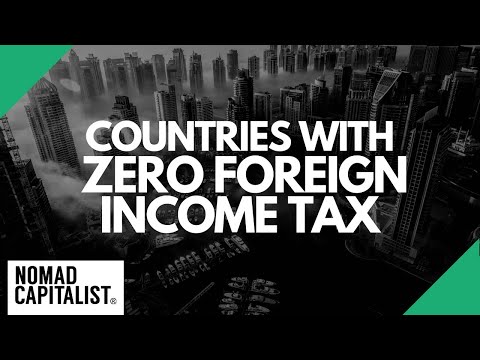The 4 Income Tax Systems Around the World
December 6, 2023
As you formulate a legal strategy to lower your tax bill, you’ll need to understand how different countries tax their citizens and residents and how those tax systems affect you.
This article will help you learn the fundamentals of global taxes by teaching you the basics of the four different types of taxation.
It covers what you will need to consider when planning your Nomad Tax Strategy, however, it’s no substitute for a professional consultation – apply for yours here.
Legally Reduce Your Tax Burden
Why are Nomad Capitalists more likely to renounce US citizenship than UK citizenship? Both passports come with similar benefits and “baggage”, if you will. Neither has the absolute best global reputation, but they’re both top-tier “Tier A” passports that offer extensive visa-free access to different countries.
However, we frequently work with US citizens who are extremely eager to renounce, but rarely encounter many British citizens looking to do the same.
The reason for this discrepancy is simple: taxes. The US uses citizenship-based taxation, which allows Uncle Sam to collect tax from all US citizens at home or abroad, so in order to escape the US tax net completely, citizens need to turn in their passports.
The UK, on the other hand, has a residential tax system, so UK citizens who do not meet residency requirements do not need to pay tax at home.
As such, US citizens looking to legally reduce their tax burden are more likely to seriously consider renouncing than UK citizens, who only need to live outside of the country.
Once this “tax non-residency” has been granted and provided they meet the conditions thereto, they won’t need to pay UK tax unless they have any assets there.
4 Types of Taxation Around the World
Today, countries use four different types of taxation – citizenship-based, residential, territorial, and zero tax.
In order to create your global tax plan as a Nomad Capitalist, you will need to understand these four types of taxation and how they apply to you as a citizen, resident, or frequent visitor of any country. Here we cover:
- How each type of taxation works.
- Countries that use that system.
- Exemptions from that type of taxation.
- How that system affects non-citizens.
We’ll conclude by giving you a rough guide to formulating your global tax strategy. The reality is that the developed world is becoming more aggressive in pursuing wealthy people and business owners for tax, so proper tax planning is important.
Citizenship-Based Taxation
Under citizenship-based taxation, all citizens of a country must pay tax on their global income by virtue of being a citizen.
This means that as a citizen of a country that uses this system, you will need to pay some kind of tax every year regardless of how much time you actually spend in the country.
Sometimes, this tax can take the form of a flat tax on worldwide income, but in other cases, different types of income may be taxed separately, depending on your source of income and individual circumstances.
However, regardless of your country’s exact laws, citizens of countries that use this type of tax system will need to file taxes at home each year unless they renounce their citizenship.
Citizenship-based taxation is the least popular type of taxation globally, but since it is used by the US, it affects millions of people worldwide.
Additionally, countries with citizenship-based taxation are not restricted to taxing only citizens, so non-citizens who meet certain requirements can also be pulled into citizenship-based tax systems.

Countries Using Citizenship-Based Taxation
Only two countries in the world use citizenship-based taxation – Eritrea and the US. Eritrea is a small, war-torn African country located near Djibouti and Ethiopia. It continually scores low marks in the realms of individual liberties, press freedom, and human rights, and many Eritreans leave the country to avoid indefinite military conscription.
Eritrea therefore levies a 2% flat tax on all of its citizens’ worldwide income.
However, Eritrea’s citizenship-based taxation is difficult to enforce. The country is a pariah in the global financial system, so it can only enforce its tax obligations outside of the country by refusing to renew passports.
The US, on the other hand, is a developed country with the world’s largest economy – and plenty of enforcement clout.Why, then, would the US use the same types of taxation as Eritrea?
The US system of citizenship-based taxation has existed for over a century, and the US government can’t seem to let it go.
Although Congress considered scrapping citizenship-based taxation while drafting the 2017 tax reform bill, it ultimately doubled down on it, and US citizens continue to be taxed on their worldwide income while living abroad – and even in tax treaty countries.
Some exemptions do exist for active income and businesses, but no exemptions exist for passive income.
The US can also enforce citizenship-based taxation far more easily than Eritrea. It can quickly track down offenders living in other countries, and the IRS can even cancel your existing passport if you owe more than $50,000.
Therefore, if you’re a US citizen, you’ll need to pay some kind of tax on your income no matter where you live.
Exemptions from Citizenship-Based Taxation
Although citizenship-based taxation is fairly draconian, the US offers a handful of exemptions for US citizens living abroad.
Foreign Earned Income Exclusion (FEIE) allows qualifying individuals to exempt a certain amount of their annual income from US income tax, and some individuals can also deduct a foreign housing credit.
You can learn more about FEIE here, but the basic premise of FEIE is that US citizens living abroad for a substantial period of time do not need to pay tax on a specified amount of their income.
US citizens can also utilize offshore companies to legally reduce their tax burdens as well. However, investments and other forms of passive income will still be taxed.
Because US tax exemptions can be difficult to navigate, I recommend consulting a tax professional if you’re looking to claim FEIE or create an offshore company.
Under this system of citizenship-based taxation, US citizens will still need to file taxes each year, and more often than not, they will need to give something to Uncle Sam.
How Citizenship-Based Taxation Affects Non-Citizens
Although the name citizenship-based taxation suggests that a country only taxes its citizens, that certainly isn’t the case in the US. Non-citizens can also get caught in the US tax net by meeting certain requirements, such as residency.
The most common way that non-US citizens end up paying US taxes is through the substantial presence test, which determines who counts as a US person for tax reasons based on how much time you spend in the country over the past three years.
Like its system of citizenship-based taxation, the US system for determining tax status for non-citizens is relatively complex, so non-US citizens who spend a substantial amount of time in the US should be mindful of these regulations to avoid paying tax in the US.
Residential Taxation
Residential taxation is a far more common – and less complex – tax system. At its most simple, residential taxation means that if you live in a county, you pay tax, and if you do not live in a country, you don’t.
Countries that employ residential tax systems typically have clear requirements that delineate whether a person is a tax resident or not. Many countries use a simple standard – whether a person has lived in the country for more than 180 or so days – as the basis for residential taxation.
However, in today’s era of digital nomads, residency requirements have begun to include things like having a valid driver’s license, owning a home, or even voting as residency.
Although you can no longer simply leave the country in most places to avoid residential taxation, the standards are generally clear-cut enough to where you can easily cut certain ties and be deemed a tax non-resident.
Of all of the types of taxation, residential systems are easiest to navigate since they set clear standards for whether a person is or is not a tax resident.
Countries that Use Residential Taxation
Residential tax systems are usually easy to navigate and cast a wide net, so it’s no wonder why the majority of developed countries use this system. Developed countries seem to prefer this system since it still allows worldwide income to be taxed yet provides an exemption for citizens who live abroad.

Countries that use residential taxation include Japan, Mexico, Canada, the UK, Australia, New Zealand, and most of the EU, and a handful of other countries across Africa, Asia, and South America also use similar systems.
Exemptions from Residential Taxation
The most obvious exemption from residential taxation is becoming a non-resident. However, establishing tax non-residency is easier said than done.
One of the most common misconceptions about becoming a tax non-resident is that you must simply spend less than 183 days in a country to avoid tax obligations. That may be true for most tourists, but if you’re a current tax resident or have a domicile there, removing yourself from that system is much more complicated.
In most developed countries, residency requirements are complex and designed to keep residents within the country’s tax system for as long as possible.
The UK, for example, has a number of specific requirements that vary based on issues like your past three years of UK tax history and location of employment, which can make its system hard to navigate for most people.
Other exemptions also exist, but they will vary among different countries. You should therefore take the time to research specific qualifications and exemptions in countries that you plan to do business or spend a large amount of time in.
How Residential Taxation Affects Non-Citizens
While residential tax systems are easy to navigate, they are also easy to become entangled in as a non-citizen. For example, if you decide to explore investments in Cambodian real estate, you may spend a substantial amount of time in the country searching for the perfect properties.
However, if your stay exceeds 182 days, you’re now a taxable resident of Cambodia. Therefore, if you’re a non-citizen visiting a country with residential tax requirements, you should carefully research its residency requirements to ensure that you don’t inadvertently become a tax resident of another country.
Territorial Taxation
Territorial taxation is, in my opinion, the most friendly tax system for Nomad Capitalists. Unless, of course, you count countries with no taxes.
Unlike residential tax systems, which tax anyone who is a resident on their worldwide income, territorial tax systems only tax residents on income earned within the territory of the country.
In Singapore, for example, many residents are wealthy expats with a number of foreign investments, but because those investments are outside of Singapore, the country does not levy a tax on those streams of income.
Therefore, if you don’t earn money within the borders of a territorial tax country, you don’t need to pay any tax on it.
Countries that Use Territorial Taxation
Territorial taxation is one of the more common tax systems, so a good number of countries use it, including Hong Kong and Malaysia.
If you want to learn more about the most livable countries that use territorial taxation, read this article.
Exemptions from Territorial Taxation
Like residential taxation, territorial tax systems clearly delineate what is and isn’t taxable. Essentially, if you earn income in a territorial tax country, you must pay tax on that income.
While this tax system is simple in most cases, it can get complicated when you work for an offshore company while residing in a territorial tax country.
Suppose that you live in a country that uses territorial taxation but your company is based elsewhere, and your company pays you through your bank account in an entirely different country. You technically aren’t earning that money in the territorial tax country, so you believe that you do not have to pay tax there.
However, because you were living and working in that country, you may end up paying tax since you were earning the money while being physically present in the country.
Territorial tax systems are more frequently cracking down on offshore corporation use, so you should work with a tax professional to ensure that you are meeting legal tax obligations if you plan to earn income while residing in a territorial tax country.
How Territorial Taxation Affects Non-Citizens
Territorial taxation most frequently impacts non-citizens who work or invest in territorial tax countries. If you own an apartment in Malaysia and rent it, for example, you would need to pay tax on that income, and if you earned a salary there, you would pay tax on that as well.
However, the beauty of territorial tax countries is that you can live in the country for substantial periods of time and not pay any tax – provided you don’t work much during your visit. This makes them an attractive option for Nomad Capitalists looking for a second residence to avoid triggering residency requirements in other countries.
Zero Taxation
While it almost seems too good to be true, a handful of countries charge no tax whatsoever. That’s right – zero. No if’s, and’s, or but’s, and no tax planning needed.
Unlike territorial tax countries, where you can pay zero tax as long as you have absolutely no locally-sourced income, zero-tax countries do not tax any type of income whatsoever.
This makes zero-tax countries the most friendly tax systems for Nomad Capitalists.
Countries that have Zero Taxation
A handful of countries do not tax a cent of your income, even as a permanent resident. These countries include many Caribbean islands, such as the Bahamas and the Cayman Islands, as well as a handful of other small countries, such as Brunei and Monaco.
This article has more information on countries where you can live comfortably without paying income tax.
Exemptions to Zero Taxation
Exemptions to a zero-tax system seem a bit contradictory, don’t you think? However, although zero-tax countries charge no income tax, you must still pay certain other types of tax.
In the Bahamas, residents and citizens do not pay any income tax, but they must pay dues like the Real Property Tax and Stamp Duties on legal documents.
Other countries with no income tax charge similar additional taxes, so before you celebrate too much, make sure that you understand what other tax obligations you may be subject to as a resident or citizen of that country.
How Zero Tax Systems Affect Non-Citizens
Non-citizens can live within a zero-tax country for as long as their visa will allow and not pay any tax. This is an appealing option for many Nomad Capitalists. Spending time in zero-tax countries can help you avoid triggering residency requirements in other countries, and you can work there without possibly becoming subject to territorial taxation.
However, some restrictions do apply.
French citizens, for example, cannot live in Monaco to avoid tax residency requirements due to a legal stipulation, and if you’re a US citizen, you will still need to pay some income tax regardless of your residency.

Creating your Tax Strategy
Consider your Tax Obligation at Home
First, you will need to account for how your country of citizenship taxes its citizens.
If you’re a US citizen, understanding the ins and outs of citizenship-based taxation can help you avoid paying double taxes, take advantage of exemptions, and make an informed decision about renouncing your citizenship.
If you’re from Canada, Australia, or another country that uses a residential system, you should educate yourself about tax residency requirements and how you can avoid triggering them. In some cases, you may simply need to limit the time you spend at home, but in others, you may need to take more permanent measures, such as establishing a second residence, to avoid residency requirements.
Think About Tax Systems when Choosing Second Residences
Next, you will need to take the time to understand the tax requirements of countries where you intend to establish a second residence.
If you plan to spend your time in exclusively zero-taxation countries, then this step is simple – you will not need to pay income tax. Given the limited number of zero-tax countries in the world, that strategy is unfortunately not completely realistic – especially when doing business globally.
You should therefore aim to establish second residences in countries with straightforward territorial tax systems and take measures to avoid accidentally becoming a tax resident when visiting countries with residential systems.
Territorial tax systems are generally easy to navigate since they simply tax your economic activity within the country.
Because territorial systems do not impose residency standards like time limits and perpetual residence, you can more easily maintain a permanent second residence, such as an apartment or condo, in those countries without paying tax on your global income.
Establishing a second residence in countries with residential tax systems is much riskier. While you can easily limit your time in those countries, purchasing or renting property long-term might cause you to become a tax resident.
So, while you might be able to spend a month or two in a residential tax country from time to time, setting up a permanent living situation might not be ideal since it may land you in the country’s tax system.
Pay Attention to Investment Taxes
Some countries tax investments and other forms of passive income differently from active income sources. On one hand, this can be beneficial. For example, territorial tax systems will not tax you on foreign investments.
However, you may have to pay tax in the country that you invested in, and some tax systems do not exclude foreign investments from national taxes. So, if you don’t play your cards right, you can end up paying double taxes.
Suppose a US citizen wants to invest in a company based in a territorial tax country. Under that territorial tax system, you may need to pay tax on that investment since it’s a local source of income, but you will also need to pay US tax.
US foreign income exclusion does not apply to passive income from investments, so in that case, you would pay tax on your investment in both your home country and the country you invested in.
Know When to Ask an Expert
Living the Nomad Capitalist lifestyle allows you to be globally mobile, but it also requires you to navigate many different tax systems. Keeping track of your investments, residences, and other tax issues can be difficult even for the most experienced international businesspersons.
If you’re not sure about your tax obligations, you should always consult a tax expert to ensure that you’ve met your obligations.
Nomad Capitalist has helped 1,500+ high-net-worth clients from around the world as their turnkey solution for offshore tax planning, dual citizenship, asset protection, and global diversification. Put our years of real-world experience to work for you.


Does Puerto Rico Pay Taxes to the US?
It’s a common question and one that often fuels confusion, debate, and a fair share of misinformation – Do residents of Puerto Rico actually pay US federal taxes? When most people think of US tax obligations, they naturally assume they apply uniformly across all US citizens. But when it comes to Puerto Rico, things are […]
Read more

Zug Canton Taxes: The Ultimate Destination for Wealth Management in Switzerland
Switzerland’s global reputation is built not just on stunning views of Alpine peaks and serene lakes but also on a foundation of exceptional quality of life, world-class infrastructure and investor-friendly tax policies. The results speak for themselves: efficient public transport seamlessly links cities and villages; the standard of living regularly ranks among the highest in […]
Read more

How Smart Investors Use Venture Capital to Build Wealth
Big companies like Google, Amazon, Facebook and Apple all started out as bold ideas backed by venture capital. Decades later, the same firms are household names, as familiar to most people as electricity, the internet, or the telephone. But hindsight is a fickle friend. The truth is, it wasn’t always so obvious they’d succeed. These […]
Read more





